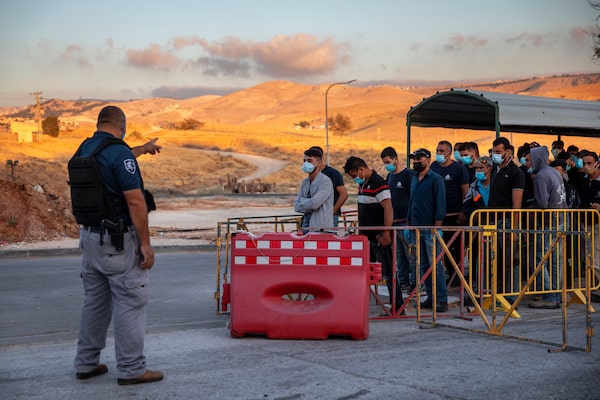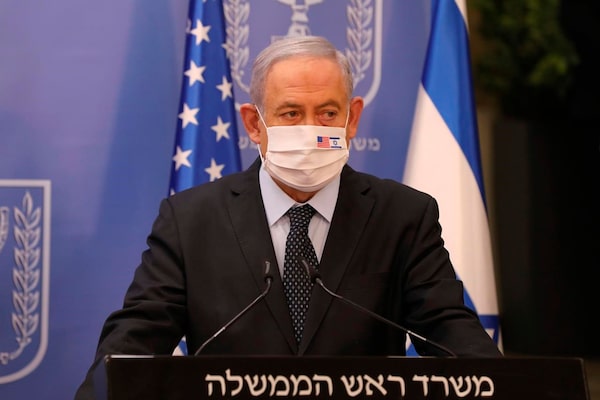
Palestinians labourers line up to cross a checkpoint at the entrance to the Israeli settlement of Maale Adumim, near Jerusalem Tuesday.Oded Balilty/The Associated Press
For more than five decades, Israel has controlled the West Bank, building Jewish settlement blocs, military outposts and a de facto border wall, while at the same time conducting off-and-on negotiations with the Palestinians, who hope to build an independent state on the land.
That status quo looks set to end in the days ahead. Israeli Prime Minister Benjamin Netanyahu was due Wednesday to unveil his plan for “extending sovereignty” over as much as 30 per cent of the land that Israel captured from Jordan in a 1967 war. Palestinian prime minister Mohammed Shtayyeh has called annexation “an existential threat [to] our future.”
It appears Mr. Netanyahu will miss his own self-declared July 1 deadline for beginning the annexations, as pressure builds on him to curb his ambitions. After a meeting in Jerusalem on Tuesday with White House Middle East envoy Avi Berkowitz, Mr. Netanyahu said his government “will keep working” on a plan “in the coming days.”
At a January meeting with U.S. President Donald Trump, Mr. Netanyahu spoke of annexing all 200 Jewish settlements dotted around the West Bank, as well as the strategically important Jordan Valley. That plan, which fit within Mr. Trump’s vision for resolving the Israeli-Palestinian conflict largely on Israel’s terms, was widely condemned as leaving the nearly five million Palestinians who live in the West Bank and Gaza Strip without enough contiguous land to build a viable state on.
International pressure, led by the United Nations and European Union, and joined by Canada, has forced Mr. Netanyahu to consider what some in Israel have dubbed “annexation lite.” The scaled-back plan would see Israel absorb the three largest settlement blocs – Ariel, Ma’ale Adumim and Gush Etzion – which lie just beyond the 1967 ceasefire line, to gauge international reaction, as well as developments in U.S. politics.
“I don’t know what he’ll do. Anybody who says they know, doesn’t,” said Dore Gold, a long-time Israeli diplomat and a former adviser to Mr. Netanyahu.

Israel's controversial separation barrier between the West Bank city of Abu Dis, left, and East Jerusalem.AHMAD GHARABLI/AFP/Getty Images
While formalizing Israel’s hold over the three settlement blocs would still violate international law, such a move is considered less fatal to the decades-old peace process, since all three blocs were expected to become part of Israel under any pact (though likely as part of a swap that would see the Palestinians acquire land elsewhere in Israel).
Speaking on Sunday to a virtual meeting of Christians United for Israel, a U.S.-based group, Mr. Netanyahu argued that he was simply moving ahead with parts of the Israeli-Palestinian peace deal that the two sides had already agreed to. “Applying Israeli law to areas of Judea and Samaria that will remain part of Israel in any future peace deal will not set back the cause of peace; it will advance peace,” he said, using the Israeli name for the West Bank. Judea and Samaria were part of the biblical Land of Israel.

Israeli Prime Minister Benjamin Netanyahu during a media statement on Tuesday.The Canadian Press
That’s not how the push is viewed by Nickolay Mladenov, the UN special envoy for the Middle East. Speaking at an anti-annexation rally in the West Bank city of Ramallah last week – which was attended by diplomats from 48 countries, including Robin Wettlaufer, Canada’s envoy to the Palestinians Authority – Mr. Mladenov said “the annexation plan violates international law and destroys the dream of a Palestinian state.”
The biggest restraint on Mr. Netanyahu is the growing talk, particularly in the EU, of imposing sanctions. Israel’s Haaretz newspaper has reported that several EU governments – including those in France, Spain, Ireland, Sweden, Belgium and Luxembourg – are in favour of sanctions, or some other kind of diplomatic punishment, if Israel begins annexing territory. The EU is Israel’s largest trading partner.
“There is a strong bond between Israel and Europe, and we want to strengthen this bond and further deepen our relations, not see them retract. However, this is what will inevitably happen if unilateral annexation goes ahead,” Josep Borrell, the EU’s high commissioner for foreign affairs, wrote in an opinion piece published Tuesday by The Jerusalem Post.
Ottawa has also criticized Mr. Netanyahu’s plans, though with no suggestion that a move to annex parts of the West Bank would affect ties with Israel. “Canada is very concerned that Israel moving forward with unilateral annexation would be damaging to peace negotiations and contrary to international law. We are also concerned that it could lead to further insecurity for Israelis and Palestinians at a critical time for peace and stability in the region,” Syrine Khoury, spokeswoman for Foreign Minister François-Philippe Champagne, wrote in reply to e-mailed questions from The Globe and Mail.
Annexations would also risk Israel’s recent rapprochement with some Arab states, including Saudi Arabia and the United Arab Emirates. Jordan’s King Abdullah II, whose country is one of the only Arab states to have signed a formal peace treaty with Israel, warned in May that annexation of the West Bank would result in the collapse of the Palestinian Authority and “massive conflict” between Israel and Jordan.
“The fact that the international community has been saying there will be repercussions is having an effect, not so much on Netanyahu, but on the people around him,” said Diana Buttu, a Palestinian-Canadian lawyer and former legal adviser to Palestinian President Mahmoud Abbas. “There are people in the Israeli public who are saying, ‘Why do this [annexation] when we’ve been able to have our cake and eat it, too?’”

Palestinians are blocked by Israeli policemen and army soldiers, some clad in masks due to the COVID-19 coronavirus pandemic, while on their way home at the entrance of a junction by the Palestinian village of Halhul, north of Hebron in the occupied West Bank, on Tuesday.HAZEM BADER/AFP/Getty Images
Security is another concern. Hamas, the Islamist militia that controls the Gaza Strip, released a statement last week saying that any annexation would be tantamount to “a declaration of war.”
Mr. Netanyahu also has domestic politics to deal with. Cracks appeared in his newly formed coalition government this week, when Benny Gantz, who serves as Mr. Netanyahu’s alternate in a complicated power-sharing agreement, said that any annexation moves would need to wait until after the COVID-19 pandemic passes. “July 1 is not a sacred date,” he said on Monday.
Mr. Netanyahu, however, retorted that he was negotiating what would happen next with the Trump administration, and not Mr. Gantz’s Blue and White party. “The issue is not up to Blue and White. They are not a factor either way.”
How far Mr. Netanyahu decides to go – or not go – will depend almost entirely on the message he receives from the White House. Mr. Trump has already turned decades of American policy on its head by moving the U.S. embassy to the contested city of Jerusalem, and by recognizing Israel’s 1981 annexation of the Golan Heights, which it captured from Syria in the same 1967 war.
Mr. Gold, who now heads the Jerusalem Center for Public Affairs, a think tank affiliated with the right wing of Mr. Netanyahu’s Likud party, said there are many who believe Israel has a window of opportunity – one that could close as early as November if Mr. Trump loses the U.S. presidential election – to achieve its aims in the West Bank.
Mr. Trump’s rival, Joe Biden, has said he opposes any annexation of West Bank land “because it will choke off any hope of peace.”
Our Morning Update and Evening Update newsletters are written by Globe editors, giving you a concise summary of the day’s most important headlines. Sign up today.
 Mark MacKinnon
Mark MacKinnon